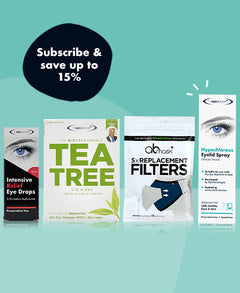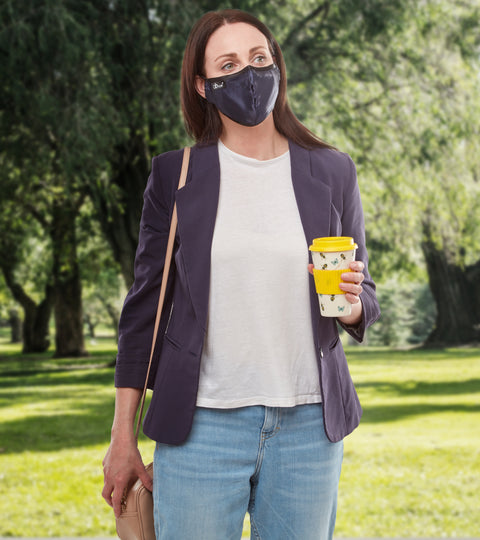Is there a face mask for pollen, dust and mould allergies?
The answer is simply, yes. It makes sense that filtering the air we breathe will help reduce not only airborne droplets and aerosols, as with the fight against COVID-19, but with irritants such as pollen, dust, mould and more; so you can absolutely wear an allergy mask! Allergy sufferers may be bolstered by a move towards mask-wearing and its overall normalisation over the last year.
The fact we have become used to carrying and wearing face masks, is likely to be a comfort to those who may seek out masks as a solution to other common issues such as hay fever. Allergens such as pollen, dust/dust-mites are known to cause a variety of side effects including runny nose, itchy and irritated eyes and can be linked to skin conditions such as eczema.
AllergyUK.org says that people suffering with Allergic Rhinitis (hay fever) and sensitisation to mites are associated with a 2.71 fold increased risk of asthma.
In the UK, ‘hay fever’ or Allergic Rhinitis is the most common form of non-infectious rhinitis, affecting between 10% and 30% of all adults and as many as 40% of children (Pawankar R, et al, 2013).
What causes allergies?
The term ‘allergens’ covers many things, from pollen and dust, through to food particles, but what causes allergic reactions? The reaction people experience is caused when a body’s immune system overreacts and wrongly detects particles as a threat, triggering an immune response. Symptoms of allergies include:
- Eye redness
- Eye irritation including dryness or watering
- Blocked or runny nose
- Breathing issues such as tightness of the chest
- In some rare and more severe cases, anaphylaxis
How do allergy face masks work, and can they filter out COVID at the same time?
Over the course of the pandemic, there’s been lots of discussion about what masks are best and of course, with medical grade masks only being suited to those in frontline positions, the best protection we can provide ourselves is to get a quality, reusable face mask with filters.
Filters naturally provide another layer of protection, helping to reduce viral load by making it harder for aerosol and droplets leaving your mouth and nose to spread, as well as preventing you from inhaling those created by other people - all the while protecting you from natural irritants such as pollen or dust. So yes, you are likely to feel the benefit of using your mask as a ‘pollen mask’ or ‘allergy mask’, but of course, if you’re primarily affected by eye irritation, then your mask will not protect you there, and you may need to seek out eye protection and/or treatment, such as allergy eye drops or eye masks.
When should I wear an allergy mask?
Wearing an allergy mask might be for you if you're one of the millions of people in the UK that suffers with mild symptoms in response to natural irritants like pollen and dust that can usually be managed with over-the-counter treatments. Wearing your mask to help manage your allergies might be beneficial in the following circumstances:
- Gardening
- Cleaning/dusting
- Changing bed linen
For example, if you’re particularly green-fingered, minimising pollen exposure while gardening could be reason enough to wear your hay fever mask outside.
Some people also use allergy masks for protection from dust-mites.
Those suffering with respiratory issues as a result of allergies, may even benefit from wearing an allergy mask for sleeping. While this is an emerging hypothesis, it is believed that some benefit may be found in wearing a dust-mite allergy mask for sleeping, when used in conjunction with other allergy management tools such as hypoallergenic bedding etc. One US study found: “Wearing a mask during sleep may be an effective allergen avoidance measure to improve asthma control and to alleviate rhinitis symptoms.”
When does an allergy require medical attention?
If you experience a sudden onset of new symptoms, or you experience a severe reaction it is always best to seek urgent medical attention. If you’ve seen a medical professional for your allergies in the past, we recommend discussing your needs with them before utilising an allergy mask.
If you’re still using reusable face masks and your allergies are starting to pick up as the weather warms, now might be the time to consider an upgrade. Our AB Mask Plus is a seven layer, reusable antiviral face mask with filter, proven to reduce tested viruses by over 99% on the material in two hours.






